Santiago de Compostela is the holiest city in Spain and the third in the Catholic world, after Jerusalem and Rome. According to the legend in its Cathedral lay the rests of the Apostle Saint James, patron of Spain.
|
 |
 |
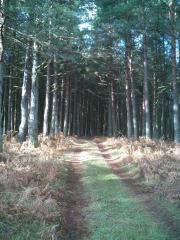 |
 |
 |
 |
 |
 |
The Camino will lead you to your essence
 |
 |
In the year 813 the sepulchre of the Apostle Saint James was found in Galicia, Northwest of Spain. The news spread all around the Christian world and in 1123, a French presbyter made the pilgrimage on horse to visit that tomb in the then called town of Santiago de Compostela (Santiago means Saint James and Compostela field of stars). He wrote the first “travel guide” in the world, called Liber Peregrinationis, with details of his hazardous journey. Soon after that hundreds of thousands of pilgrims started to travel to Spain to revere this tomb. Thus the Camino was created, until today, although the number of pilgrims has diminished considerably.
You can initiate the Camino in any place in Spain, or in Europe, or in the world, but the four most common starting points are in France: Paris, Le Puy, Vezelay and Arles. The first three ways join in the appealing walled little town of Saint Jean Pied de Port and cross the Pyrenees to enter the Iberian Peninsula until the first Spanish village called Roncesvalles. The fourth way traverses those mountains in Somport. The four ways converge in the village Puente la Reina, not far from Pamplona, and the Camino becomes only one, known as Camino Frances.
The authentic pilgrim does the Camino on foot, but some do it in bicycle. Usually they walk an average of 30/35 kilometres per day, stopping to sleep in monasteries, churches and in shelters for pilgrims. Many perform the Camino as a sacrifice, some for a vow, a few as an internal experience, and still others just for fun, to enjoy the trekking and to visit astonishing Cathedrals and Romanic temples along the regions of Aragon, Navarra, La Rioja, Castilla and Galicia. The Camino, like the sun, is generous with everybody, virtuous or sinner; you do no have to be a Christian to undertake it; I met Jews from Israel with their kipas on their heads, Japanese with Shinto beliefs, and many atheists.
I will try to sum up in these lines the pilgrimage that I made in Feb. 2006
|
|
| Favourite spots: |
 |
 |
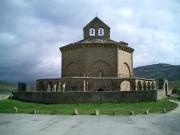 |
 |
 |
 |
 |
 |
Eunate temple. I deeply loved it.
 |
 |
The third day after Roncesvalles I stopped in an intimate place, the lovely temple of Eunate, an old cemetery for pilgrims, erected when performing the Camino was a dangerous undertaking because of the bandits and beasts. Before crossing the threshold I respected the rules written at the gate: “It is not a trivial thing to enter a temple. First leave your rucksack, take your shoes off, go around it externally three times and ask the sphinxes of the main gate for permission to go inside. Then, place yourself in the centre and you will hear: It was erected by the silence”.
The next day I reached the historical Estella. It was Sunday and entered the church San Pedro de la Rua. Inside I felt everything so harmonious, the sound of the organs, the sweet Gregorian chants, the delicate voices of the choir members, the circumspect and grave attitude of the believers assisting to the mass, that I knelt down and wept as a little boy, I could not refrain from some tears falling down my face.
|
|
| What's really great: |
What is really great are the companions. The camaraderie and solidarity created is admirable. I met French, Italians, Germans, English, a lot of Brazilians inspired by a book of Paulo Coelho, and many Americans with the book The Camino, by Shirley McLaine.
I made friendship with an aged Dutch who told me that in the past he worked in a shipping company in Rotterdam, where he reached an important position. One day, tired of the stress and competitively of his daily life, he made the Camino on foot from Amsterdam to Santiago and became so enraptured by the experience that he decided to remain in the Camino forever, helping other pilgrims to find their way. He had a Colombian woman as his companion, also a pilgrim, whom he met in the Camino.
In Logrono I met a group of Belgians guided by an armed guardian. They were convicts doing the Camino. By observing this ancient institution established long ago by the Belgian Government, they will be redeemed from their prison terms.
|
|
| Sights: |
 |
 |
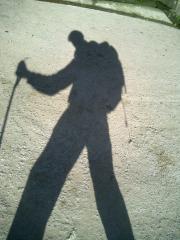 |
 |
 |
 |
 |
 |
Arriving to Santo Domingo. Even my shadow was tired
 |
 |
Santo Domingo de la Calzada is a magical place along the Camino. The Cathedral and the many temples in the centre make it a delightful day of visit. It was founded by Saint Domingo, who constructed calzadas (paths) and bridges across the rivers to help the pilgrims. The shelter is located in the same house where he lived, close to the Cathedral where his corpse is kept. You will be woken by the cackle of the hens, symbol of the Saint, because he performed a miracle: a young German pilgrim was mistakenly taken for a thief and condemned to be hanged. Santo Domingo made the rope around his neck useless, and did not die. When the judge, who at that moment was about to eat a hen, was advised of this fact he did not believe it and uttered: “If the German is alive, then this hen is also alive”. And just at that moment the hen became alive and started to cackle around.
Do you know the main souvenir that tourists and pilgrims buy in that city? … Yes, you guessed right: small figures of hens!
|
|
| Accommodations: |
 |
 |
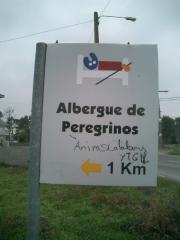 |
 |
 |
 |
 |
 |
Announcement of a shelter for pilgrims with the yellow arrow
 |
 |
The person in charge of the shelters is called Hospitalero. He will explain you the conditions to use the dormitories. Many shelters are for free, even the food, some will suggest you a voluntary small contribution, and still others will fix a price to spend the night, which oscillates between 3 and 6 euro. No sheets are provided but you can find blankets. You will need sleeping bag. You are only allowed to spend a single night in each shelter, except in the case that you get sick. In summer there are too many pilgrims and the shelters are often full.
There are shelters in old castles owned by the Sovereign Order of Malta and are ruled by Italian Hospitaleros.
If you can afford it, there are three historical and unbelievably charming Hotels called Paradores, which in the past were shelters for pilgrims: in Santo Domingo de la Calzada, in Leon, and in Santiago de Compostela. The price for a double, if you are pilgrims, is not expensive considering the exquisite conditions: 100 euro
|
|
| Nightlife: |
 |
 |
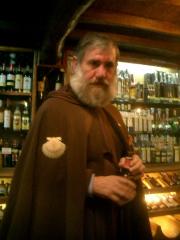 |
 |
 |
 |
 |
 |
Some pilgrims wear the shell, main symbol of the Camino
 |
 |
There are no clubs or pubs along the Camino, except in cities such as Leon or Burgos. The shelters use to close at 9 PM and you are advised to keep a quiet state of mind, without mundane distractions. The best way to spend the night before sleep is talking with your companions. Some make plans to continue the pilgrimage from Santiago to Finisterre, in the Atlantic Ocean, to burn their clothes symbolizing the death of the old man. Often there are idylls and some couples have been formed in the Camino and got married.
One night I met a girl in a shelter of Castilla. She told me that her mother fell ill and took her to the hospital, where the doctors said that she had cancer and soon will die. Then, she, being atheist, prayed for the first time in her life and asked God for help. Next week she brought her mother to another hospital and the doctors confirmed that she had no cancer. Was it a mistake of the first doctor? Was it a miracle? The girl decided to make the Camino as gratitude.
|
|
| Hangouts: |
 |
 |
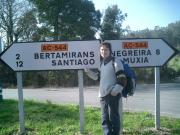 |
 |
 |
 |
 |
 |
Still 12 kilometres to arrive to Santiago
 |
 |
The greatest part of the Camino goes through pleasant paths with high trees and soft leaves on the ground. Except the crossing of the Pyrenees and the arrival to the Galician O Cebreiro Pass, the Camino is almost flat, always signalled with yellow arrows painted on the trees, on the walls of some houses, or on landmarks made on stone called “mojones”.
These signs will take you to enchanted places of the deep Spain such as the fairy tale Gaudi Palace in Astorga; the Templar Fortress of Ponferrada; the magnificent Church of San Martin de Fromista, the most stunning example of the Romanic in Spain; the incredibly beautiful Cathedral of Leon, which 1800 square metres of stained glass windows are regarded as one of the best work of its kind in the world; the startling frescoes of the old Colegiata de San Isidoro, which is considered the Spanish Capella Sixtina; or to the monasteries of Leyre and Sarria where you will be told by the monks fantastic legends that are beyond imagination.
|
|
| Restaurants: |
 |
 |
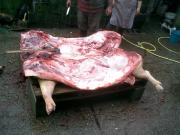 |
 |
 |
 |
 |
 |
I was hungry and ate in this village. Look at the man with the knife. Sometimes life is cruel
 |
 |
There are restaurants offering the “Menu del Peregrino” for about 7 euros in many towns along the Camino. Two mythical restaurants that you should not miss are: Casa Ezequiel, in Melide (try “pulpos a la gallega”, octopus in English), and Casa Manolo, in Santiago. In small villages where there are not restaurants you have to eat whatever you find. In the shelters you can cook the products that you have bought. It is common to share the food among the pilgrims: one brings macaronis, another one a bottle of wine, some supply fruits, etc. Dinners are a pretty way to make friendship with your companions.
Once in Santiago you can eat for free three times a day, during three days, in the Hostal dos Reis Catolicos, in the Plaza del Obradoiro, if you are a pilgrim and previously got the Compostela document in a house in front of the Cathedral called “Casa do Dean”, which is issued before the presentation of a card, called Credencial, that will be stamped in every shelter by the Hospitalero.
|
|
| Other recommendations: |
 |
 |
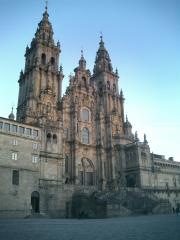 |
 |
 |
 |
 |
 |
Santiago de Compostela, I made it, Ultreia!
 |
 |
I arrived excited to Santiago and eagerly embraced the bust of the Apostle Santiago behind the altar of the XI century Cathedral. Afterwards I assisted to the Pilgrims Mass, in the course of which our names were cited.
Will you be wiser and find the “nirvana” after having done the Camino? I can’t assure you that because it all depends on the level of the development of your being before starting the pilgrimage. The Camino, day after day, little by little, without realizing it, changes the inner world of the pilgrim, shows the way and provides conditions. While doing the Camino you are one with the nature; you have all the elements to be joyful and reconcile with yourself if you are receptive to the signs: the singing of the birds, the whisper of the wind, the marvellous vision of the stars during the night, the movements of the sun and the moon along the arch of heaven… everything is there, before your eyes, but it is up to your aptitude to understand.
Ultreia y buen Camino!
|
|
Published on Saturday April 1th, 2006
|
|
 Publish on Facebook
Publish on Facebook
|
Wed, Feb 18 2009 - 02:53 AM
 by szidonia
| Is there any words in any language which can describe the silence of the arch of heaven… ? |
Sun, Oct 15 2006 - 09:03 AM
 by sajjanka by sajjanka
Sun, Apr 09 2006 - 09:27 AM
 by eirekay by eirekay
| Jorge, I had wanted to do this pilgrimage when I was in college but couldn't find anyone to do it with me. You report makes me realize that this is something I still need to pursue! Thanks! |
Tue, Apr 04 2006 - 02:02 AM
 by gloriajames by gloriajames
| From your report and account of your journey, I too feel that I had taken the walk with you! I doubt I might ever get to do this walk, nevertheless if i do want to do the walk, I will do so by reading your report again and again! Bravo and once again 5* for me! |
Sun, Apr 02 2006 - 11:10 PM
 by terje by terje
| This trip is one of the things I must do in my lifetime. Thanks!! |
Sun, Apr 02 2006 - 01:52 AM
 by st.vincent by st.vincent
A wonderful report, proving that it really is better to travel than to arrive. Very well written with a personal style that makes us believe we are experiencing it with you. A story about the first travel writer from a master of modern day travel writing.
|
Sun, Apr 02 2006 - 01:13 AM
 by ravinderkumarsi by ravinderkumarsi
very nice report ,well written.
|
Sat, Apr 01 2006 - 10:56 PM
 by frenchfrog by frenchfrog
| Splendid, a must do for devoted Christians! Well written reports with lost of info, many thabks for that!. |
Sat, Apr 01 2006 - 06:53 PM
 by rangutan by rangutan
| Excellent, my hat off to someone who uses modern transport but still can appreciate the hard old way of travelling and the real meaning of life. Thanks for sharing this very personal adventure with us, some of us will follow! God bless you. |
Sat, Apr 01 2006 - 09:04 AM
 by mistybleu by mistybleu
| Another wonderful report. |
Sat, Apr 01 2006 - 08:43 AM
 by davidx by davidx
Good to see a report from you again, Jorge. As always, it's truly first class.
I'm one of the minority who doesn't like Santiago de C but I'd love to be fit enough to walk the Camino! |
| Information: |
| Login if you are a member, or sign up for a free membership to rate this report and to earn globo points! |
|
| Afghanistan |
|
|
 |
| Argentina |
|
|
 |
| Bosnia - Herzegovina |
|
|
 |
| Brazil |
|
|
 |
| Canada |
|
|
|
|
|
|
 |
| Chad |
|
|
 |
| Chile |
|
|
 |
| China |
|
|
 |
| Christmas Island |
|
|
 |
| Colombia |
|
|
 |
| Dominica |
|
|
 |
| Falkland Islands |
|
|
 |
| Germany |
|
|
|

|
